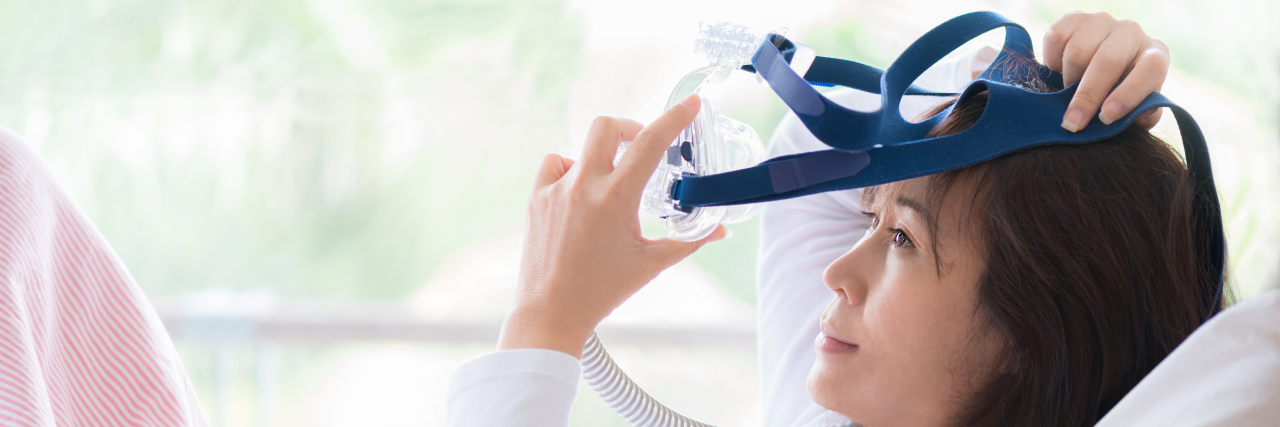My husband and I both have sleep apnea. We also both have depression, or at least he does, and I have bipolar disorder with a pretty hefty depressive bent.
Sleep apnea is a medical condition in which a person stops breathing multiple times a night. The body responds to this by resuming breathing after a second or two, but sleep disruption has already occurred. For my husband, this occurs up to 60 times a night, while it happens to me more like six times. Technically, my version is called “hypopnea” (hypo+pnea – low+breath; apnea, a+pnea – no+breath.)
The body depends on breathing, of course, for oxygen, but it also depends on sleep – which is disrupted in sleep apnea – for proper functioning. REM sleep, for example, is vital for dreaming, which has multiple beneficial effects on the body and mind. REM sleep has been known to be altered in depression, and studies have suggested that it is involved in modulating mood symptoms, including psychological distress in general.
One of the more observable symptoms of sleep apnea is loud and prolonged snoring, which both my husband and I have experienced. While I was traveling with my mother, she even requested that I let her go to sleep first since my snoring kept her awake.
But what does sleep apnea actually do to the brain? Surely lack of oxygen to the brain has some effect.
Indeed it does.
According to research conducted at UCLA, “gasping during the night that characterizes obstructive sleep apnea can damage the brain in ways that lead to high blood pressure, depression, memory loss, and anxiety.”
Sleep apnea has been associated with difficulty concentrating, memory problems, poor decision-making, depression, and stress. A study published in Sleep Health found that untreated sleep apnea increases the chance of anxiety by over three and a half times; depression, by more than three times; severe psychological distress, by not quite three times; and suicidal thoughts, by more than two and a half times. Sleep apnea has also been associated with PTSD. The Journal of Clinical Sleep Medicine recommends that “in individuals with [obstructive sleep apnea] and psychiatric illness, treatment of both disorders should be considered for optimal treatment outcomes.”
Studies suggest that sleep apnea is linked with changes in at least two neurotransmitters in the brain (GABA and glutamate) that combine and coordinate signals that help regulate emotions, thinking, and some physical functions. Researchers plan to investigate whether treatments for sleep apnea will help these brain chemical levels return to normal.
SSRIs (selective serotonin reuptake inhibitors) such as fluoxetine and sertraline (Prozac and Zoloft) are thought to be valuable in treating sleep apnea. One study indicated that SSRIs may be a good treatment option for [sleep apnea], particularly for those [patients] with epilepsy. Another study showed a link between “having sleep apnea and increased odds of having a mental health issue” or symptoms such as anxiety or thoughts of suicide.
Treatments for sleep apnea include dental appliances to be worn while sleeping, lifestyle changes, and even surgeries. These treatments sometimes address snoring directly, but not the underlying mechanism. The more effective treatment is “positive air pressure,” delivered by CPAP machines.
CPAPs use positive air pressure to keep the sleeper’s airway from collapsing, which is what impedes their breathing and jolts their brains into resuming it. They consist of a unit that generates air pressure, a hose and mask to deliver it, and assorted straps to keep the hose in place throughout the night. The masks can be ones that cover the entire nose and mouth or cannulas that are simply placed in the nostrils. There are also cushions on the masks or available separately that reduce discomfort as well as waking up with “mask face.” Many people find the masks uncomfortable to wear all night, but others use them not only at night but also for naps. Unlike a ventilator, the CPAP doesn’t breathe for a person. It allows them to breathe more effectively on their own.
Diagnosing sleep apnea requires a “sleep study” ordered by a doctor. Assorted leads are attached to the subject, who then spends all night sleeping (or trying to). Breathing rate, heart rate, oxygen saturation, and other parameters are measured and a record is kept of the number of times the subject stops breathing during the night. This is sent to the doctor, who can then prescribe a CPAP unit and mask.
Dan and I both use CPAP machines. They are a bit inconvenient, especially when we travel and have to take power cords so we both can use them at the same time (and power converters when we travel abroad). When it comes to packing, the machines are a bit bulky and somewhat heavy. Still, we take them with us religiously.
Has sleep apnea treatment improved our mental health? It’s hard to tell, especially since we’re both taking SSRIs anyway. I know correlation isn’t causation, but our depression and bipolar have certainly eased up since we started getting treatment and our sleep cycles have become more regular. But if all it does is stop the snoring, that’s still a win for us.
So, if you snore a lot and have a mental health condition, you might want to be tested for sleep apnea and treated if you do. Like chicken soup, it can’t hurt and might help.

